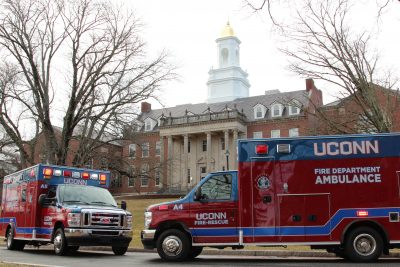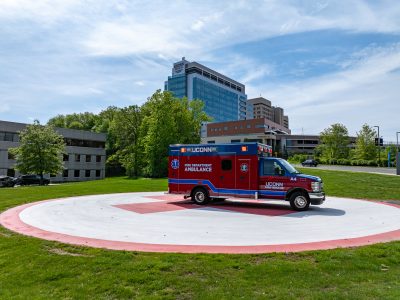
MEDICAL EMERGENCY?
UCONN COUNTS ON US.
FIRE-BASED EMERGENCY MEDICAL SERVICES
The University of Connecticut Fire Department’s Emergency Medical Services (EMS) program delivers an integrated spectrum of Basic and Advanced Life Support from two strategically placed stations—Station 22 on the Storrs campus and Station 122 at UConn Health in Farmington—ensuring seamless coverage for the University community and the surrounding regions. Since hosting Connecticut’s first paramedic training program in 1975, which included four of our firefighters among its inaugural class, we have built a legacy of innovation and excellence in pre-hospital care. That same year, our newly trained paramedics provided critical medical support for President Gerald Ford’s visit to Hartford, underscoring our readiness for high-profile events. Over the years, our fire-based EMS has also provided coverages for several sitting and former United States Presidents, dignitaries, and world-wide political leaders and activists whenever they visit the University of Connecticut.
UCFD works closely with Student Health and Wellness (SHaW) on campus. In the event of a life threatening medical condition, the department coordinates with Student Health and Wellness to provide the highest level of care. If you have a medical condition you want UConn Fire Department's EMS providers to know about, contact Student Health and Wellness (SHaW).

BASIC LIFE SUPPORT (BLS)
At Station 22, UCFD provides primary BLS care and ambulance transport to the Storrs campus and mutual aid to the community beyond. All UCFD personnel are trained to a minimum of EMT-B and respond to all nature of 911 emergency calls – ranging from traumatic injuries and cardiac arrests to acute mental health crises. These clinicians maintain certifications in CPR, Stop the Bleed, and Tactical Emergency Casualty Care, ensuring they can render lifesaving interventions in both routine and high-risk situations. UCFD personnel are experienced in servicing the unique medical needs of the campus community and approach proficient patient care with a high level of compassion and understanding. UCFD works closely with area ALS providers to assist with higher levels of care when needed.
UCFD provides on-site medical standbys for a variety of large-scale campus activities, including Graduation and Commencement, Spring Concert, HuskyThon, Oozeball, many on-campus athletic events and NCAA Tournaments. UCFD also provides a transport ambulance and sideline standby crew to Rentschler Field for home Football games.
At Station 122, UCFD offers non-emergency patient transports through our UConn Health EMT Transfer Division. UConn Health EMTs provide expert and compassionate care to patients who require ambulance transport from UConn John Dempsy Hospital to home or another facility. These valuable personnel report within the Fire Department, operating separately from its emergency response structure.

ADVANCED LIFE SUPPORT (ALS)
On the ALS side, fire based paramedics based at Station 122 bring advanced skills to every call. They are certified in Advanced Cardiac Life Support and Pediatric Advanced Life Support, and routinely perform advanced airway management, drug administration, and cardiac monitoring. Paramedics deploy both on dedicated transport ambulances—so that patients receive the highest level of care en route—and as intercepts with BLS ambulances in the field whenever a patient’s condition warrants an ALS upgrade.
Our EMS extends well beyond campus borders through formal mutual aid agreements with neighboring communities, both in Tolland County, Windham County, and Hartford County. Whenever local departments are stretched thin, our ambulances and crews respond to support calls across the state within our respectful counties, and as a part of established strike teams and task forces.

50 Years of ALS
As we celebrate the 50th anniversary of our paramedic program in 2025, the University of Connecticut Fire Department’s EMS remains committed to continuous improvement. Our personnel renew certifications annually, and specialty training in areas such as interfacility critical-care transport keeps us at the forefront of best practices. Whether meeting the urgent needs of a campus medical emergency, providing standby coverage at a major event, or supporting our mutual aid partners, UCFD EMS exemplifies the integration of compassion, precision, and professionalism that defines our half-century of ALS service, and over 126 years of first responder and BLS care.